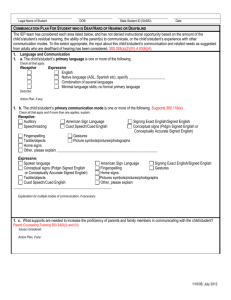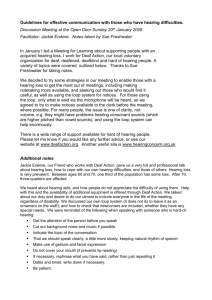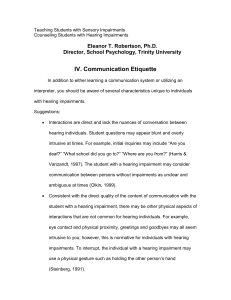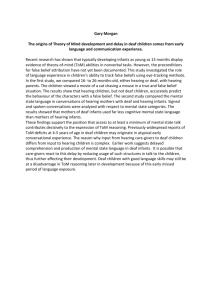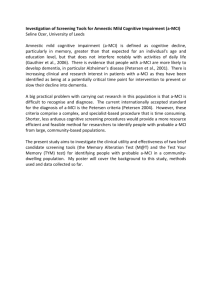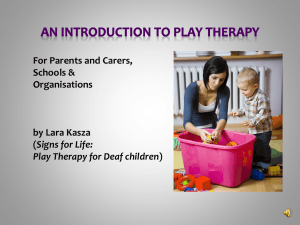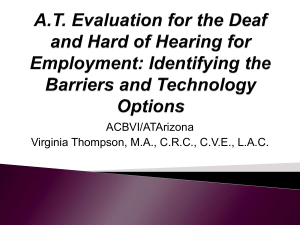Strategies for Successfully Engaging Families
advertisement
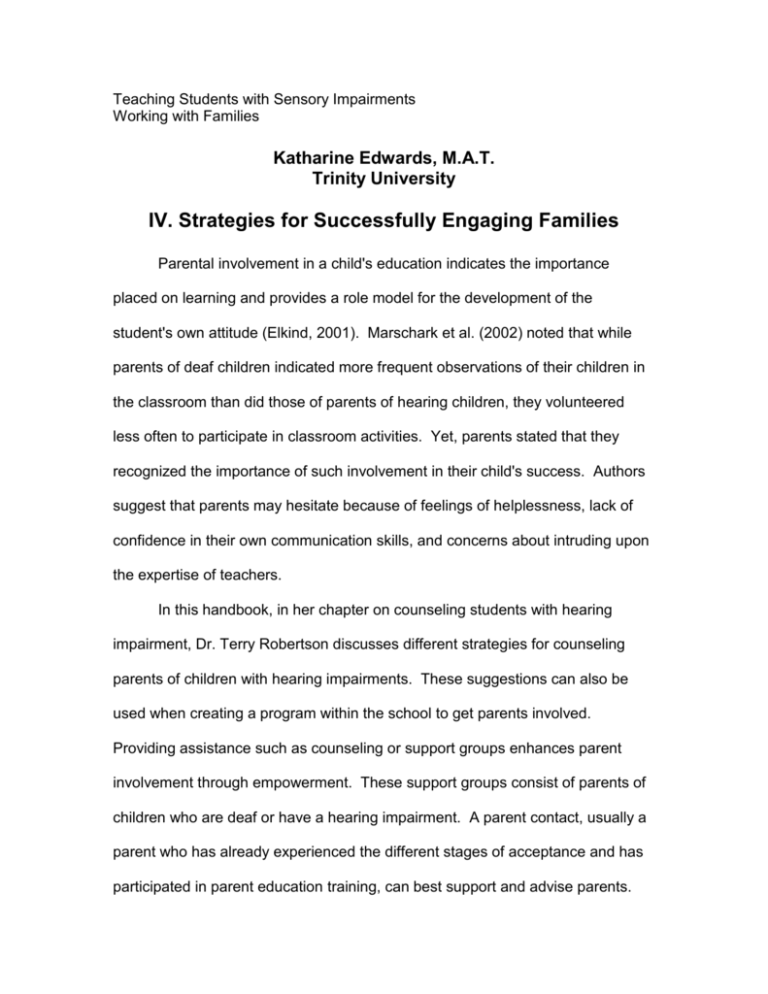
Teaching Students with Sensory Impairments Working with Families Katharine Edwards, M.A.T. Trinity University IV. Strategies for Successfully Engaging Families Parental involvement in a child's education indicates the importance placed on learning and provides a role model for the development of the student's own attitude (Elkind, 2001). Marschark et al. (2002) noted that while parents of deaf children indicated more frequent observations of their children in the classroom than did those of parents of hearing children, they volunteered less often to participate in classroom activities. Yet, parents stated that they recognized the importance of such involvement in their child's success. Authors suggest that parents may hesitate because of feelings of helplessness, lack of confidence in their own communication skills, and concerns about intruding upon the expertise of teachers. In this handbook, in her chapter on counseling students with hearing impairment, Dr. Terry Robertson discusses different strategies for counseling parents of children with hearing impairments. These suggestions can also be used when creating a program within the school to get parents involved. Providing assistance such as counseling or support groups enhances parent involvement through empowerment. These support groups consist of parents of children who are deaf or have a hearing impairment. A parent contact, usually a parent who has already experienced the different stages of acceptance and has participated in parent education training, can best support and advise parents. Having a strong support group consisting of people who have experienced or are experiencing the same concerns can truly help the healing and empowering process. Implementing a support system helps parents become more open when discussing their child’s hearing impairment and in explaining medical subjects and assistive technology. Parents are able to retain information better and begin asking questions that will help them fulfill their child's needs. Schools can help implement these groups by providing meeting space. Speakers can be brought in to discuss different subjects that relate to parents and to answer their questions. Parent liaisons can also be appointed to help organize such events. It is important that these group meetings provide both valid information and social support. Along with regular meetings, social outings such as dinner or recreation (picnics, camping, bowling, etc.) can provide additional activities for families to enjoy. In their Parent Education Resource Manual, Gallaudet College underscores that the programs should “provide ongoing activities that will foster the cognitive and affective growth” of the parents involved (p. 11). To assist in structuring these groups, a curriculum can be developed to address appropriate responses to questions about common issues and such as puberty, sex, and drug education, to help parents support the full educational development of their child. Main categories that parent programs address include family, education, government, partnerships, resources, advocacy, and special circumstances (i.e. adolescents, rural families, students with complex disabilities including hearing impairment). With parental approval, involved adults might also develop a directory of families with children who are deaf or who have hearing impairments (Hallau, 2002). This will make it easier for families to reach out to others and provide or receive support. Parent education should also be incorporated into a school program. If parents see that the school is making an effort to help them, they will be more willing to attempt to help the school and classroom. Parents should also be given a chance to learn more about medical or audiological terms regarding their child. Schools can provide time in group settings to introduce these terms. They can also provide resources such as pamphlets, books, contact information, and mentors which will be able to help parents find out more about their child’s special needs. Author of A Parents’ Program in a School for the Deaf, Paul Rotter, adds that parents must be provided with an, “understanding of normal child development with insight into the likenesses between deaf and hearing children" (p. 11). While written decades ago, Rotter's (1969) words ring true today: Parents of deaf children certainly require an early, accurate orientation to deafness, the long- as well as the short-term prognosis, an explanation of the limitations of deafness as well as the educational possibilities, and a generally positive developmental approach rather than overly heavy emphasis on the disability” (p. 11). Schools and specialists are trying to empower parents and encourage them to be a strong and educated advocate for their child. While a variety of issues must be addressed, a focus on how parents and their children will reach positive goals should be a primary emphasis in a parent involvement program. Parents must be exposed to a good selection of resources regarding not only child development but also, “hearing, hearing-aids, [cochlear implants], speech and language, auditory training, speech-reading, and educational and vocational programs” ( p. 21), and then taught how to understand and use these resources. Continuously, we observe that students become stronger and more active learners when their parents are involved in their learning in some way. Realizing this, many schools find it beneficial to have a policy where parents can observe classrooms and discuss concerns as well as give positive feedback to the faculty. A willingness to incorporate parental input demonstrates that the school values their participation and opinions and that these are integral parts of a functioning education. Too often, fund-raising becomes the focus of family involvement. Parents are best involved in other aspects of the school such as developing a parent newsletter which would discuss support dispersal of information, ongoing activities, available resources, and contact information. Parents also are needed to tutor children, instruct small groups in review activities, help create materials, supervise in the lunchroom, and work in other areas suggested by the teacher (Waldron, 2005). Positive parental involvement can also extend further than helping within the schools. Hallau (2002) notes that parents can encourage home visits for specialists, counselors, and teachers so they can understand family issues and observe more of the student’s specific needs. Parents can also help organize school activities such as field days, chili cook-offs, picnics, multi-cultural festivals, and field trips. Parent groups can work with the school to help develop after school programs and weekend workshops, such as sign language courses, that would appeal to parents and students. For optimal communication, teachers and the Principal should have email devoted to parent/school communication. For those individuals who have access to a computer, this method of communication can be quick and efficient. Teachers can also send home a communication log which discusses student activities and how each particular student is doing (Hallau, 2002). They may send requests or invitations home as well. Not only is this a good way to involve parents in education, it also a good communication device between parents and children. Parents are able to see what their child has been doing in school and many times this log can be a conversation starter. Parents can also use this log to write back to the teacher requesting more information or to discuss things the student has been doing at home. Other means of communication can come through “school-wide newsletters, long-range calendars, daily summaries of the child’s day, and routine phone calls” (Hallau, 2002, p. 12). When developing a program that strives to get parents involved in their child’s education, schools and teachers must remember that the structure and spectrum of support and activities depends on the population of the school and community. Schools in rural areas will have different resources and needs compared to schools in urban areas. Money, food, child care, and transportation must be considered when starting a program (Hallau, 2002). Access to these resources is important and will greatly affect parent participation and the outcomes of a program. It would also be beneficial for schools to bring in adults who are deaf or have hearing impairments so that they may not only serve as role models for the students but can also act as resources for parents regarding experiences, the Deaf community, and technology (Hallau, 2002). Schools must look at the parents’ and students’ diverse needs and experiences before any kind of outreach is developed. To assure that schools have met these needs, parents and students should be involved in the planning process. Because they have helped develop their own program, this involvement also affords a sense of ownership and empowerment.


